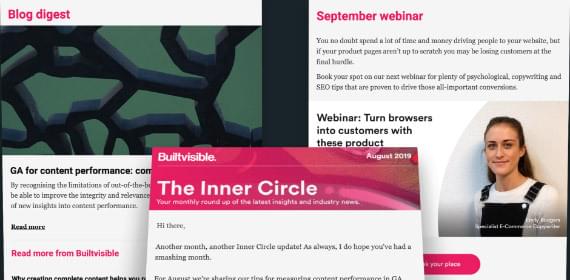Stability
I am all about building long-lasting relationships.
Stability in a client-agency relationship means complete alignment, an understanding of what you’re trying to achieve together, huge working efficiencies and generally a much more pleasant experience for everyone involved.
A stable agency is an agency that knows how to run accounts, look after its people and grow consistently.
1. What is your client retention rate?
Losing clients is part of agency life and can happen for myriad reasons.
An agency with a demonstrable track record of retaining their accounts is one that has its house in order. It means they are doing what they said they’d do in terms of delivery, it means they are accountable to the performance they are driving, and it means they understand their clients’ businesses enough to have the right conversations with the right people.
It also means the agency is probably managing their resourcing properly and not over-selling (and consequently under-delivering). The ability to do what they say they’ll do is invaluable and increasingly rare in favour of profits but if you can find a partner who takes a hit on revenue to make sure they are doing the best they can for their clients you are on to a winner.
If you’re hiring an agency with an outstanding retention rate, you’re hiring a safe pair of hands that will have your back.
2. What is your staff retention rate?
Hiring good people is very difficult. Keeping them even more so.
And agencies are terrible at it.
You get sold the dream with a senior account team, but then the rug gets pulled from under you when the people who actually work on the account leave for pastures new.
A variant of this is often a procurement-led question because they understand the protection of their investment that stable agency staff can bring.
If an agency isn’t investing in its people, constantly challenging them and creating a culture where they can thrive, then the likelihood is you’re going to go through some pain as new recruit after new recruit has to get up-to-speed with both their new employer and the marketing spend with which you have entrusted your agency.
3. How do you generate business?
A good agency generates its own business.
Understanding what percentage of new leads come through referrals can offer valuable insight into how that agency performs for its clients, what type of relationships it builds and whether people have confidence in their capabilities.
Making a recommendation is a hugely personal thing to do, with the recommender’s reputation and ego on the line. If people are willing to do it consistently, you’re probably on to a winner.
Aggressive lead generation and client/revenue acquisition at the expense of product and service? I’d be staying away.

Relevance
You need to know your agency is the right partner for your organisation.
4. What relevant case studies do you have?
Case studies are an integral part of the pitch process. They provide evidence that the people you are talking to are capable of delivering on their promises. But how relevant are they to your business?
The degree of relevance is always going to sit somewhere on a spectrum from your main competitor through to a case study that makes no sense to you whatsoever. The likelihood is that both of these extremes are unlikely in most instances, but there is gold in the spectrum when approached with the right mindset. A potential agency’s choice of case studies should offer insight in to how much they understand your business and associated challenges.
Outside of relevance to your product or service offering, a pitch provides a great chance to dig into wider sector experience as well as situational relevance. Are you seeing an example of this agency solving a similar problem or reacting to a similar situation that they have experienced before – even if not topically relevant, for example?
I would be weighing this far heavier than award wins, too.
5. How recent are your case studies?
Is an agency still having the success they talk about?
Case studies are always going to be an agency’s best work. They demonstrate capabilities and results at their best, but the unfortunate reality is that sometimes agencies are past their best, have experienced turbulence after a few golden years or are just dining out on the same old examples. The latter happens a lot.
Seeing recent case studies shows your potential partners are still performing at the levels they say they can, clearly demonstrates they can operate at this level consistently, and also means they are able to effectively communicate relevant information to you – which bodes well for a successful relationship!
6. Can you introduce me to some of your clients?
Everyone is always going to put their best people, work and sales decks in front of you. If they don’t, the likelihood of them being present at the sharp end of the sales process is dramatically reduced.
A nice way to establish differentiation between suppliers is to speak with similar, relevant clients to understand what the experience of working with that agency is like, as well as to validate the claims they make during the pitch.
This qualitative approach adds a layer of depth to your decision and is another opportunity to dig in to what is important to you personally, and as an organisation.
7. What clients have you lost recently and why?
Losing clients is part of agency life and can happen for a plethora of reasons.
The first part of this question is easy to answer but the gold is in the latter. As well as getting a sense of how honest the agency is, their understanding of why this happened provides fascinating insight in to how they think about their accounts, and therefore potentially yours.
Are they accepting client loss as an inevitability or have they taken positive steps to move forward and develop their offering, products or processes to both protect themselves and better service their clients in the future.

Financials
Because if your agency is well run, your account will be too.
8. How are your YOY financials – both in terms of turnover and profit?
First and foremost, the people you are talking to should know this about their own business. It demonstrates a level of awareness that will make you feel comfortable they understand business and not just their field of expertise.
Digging in to growth or otherwise is an excellent measure as to whether the formula/approach your potential supplier is working to is effective, reveals how they operate at scale and also gives you a sense of where you fit in to the grand scheme of things in their world.
Being a big fish in a small pond has its merits, as does the opposite – understanding the numbers helps you quantify this and make a more informed decision.
9. What percentage of your revenue is retained?
Retained revenue is the holy grail of agency growth.
If clients are committing long-term spend it demonstrates their faith in the agency to deliver. It also means the agency can plan for the future and stay true to their word in terms of delivery, instead of constantly chasing sales.
Usually in the custody of operations or finance, this data point can again open up the truth behind the claims you are seeing in a pitch.
10. What does the future look like for your agency?
Most pitches are validated by what has gone before, but you are signing up to an agency’s future.
Within that notion you are buying in to a group of people, unified by a strong management team, who are going to deliver that future for you and your organisation, so scrutiny on this is incredibly useful as another data point to consider.
A clear vision and articulation of how the agency is going to grow its people, products and services, client base and of course its financial performance should give you enormous confidence in your decision-making.
As I said at the start, some agencies are right for some clients.
The questions above are not a universal blueprint; instead, they represent a mindset that can unearth the characteristics that matter to you and your organisation.
In a world where service offerings may appear like-for-like, the application of this mindset ensures a greater depth of mutual understanding, meaning you can focus on delivering a long-term positive impact.

Sonia Rousse
All the points are amazing but i like point no. 7 “What clients have you lost recently and why?” I think it is the most difficult question in the whole article.
Josh Whiten
I agree, question 7 is pretty brutal but probably worth exploring. Although I’m not sure you’d always get the most honest of answers!